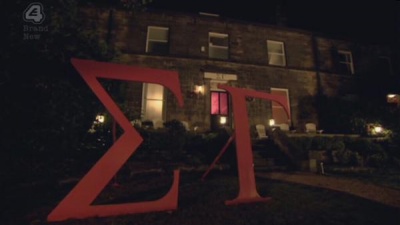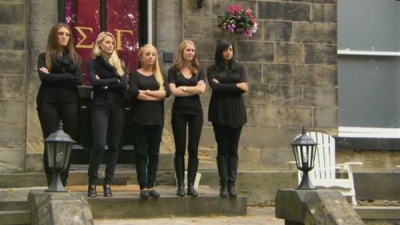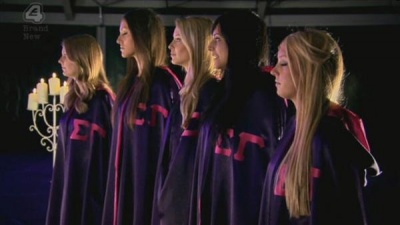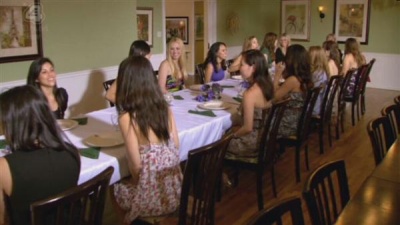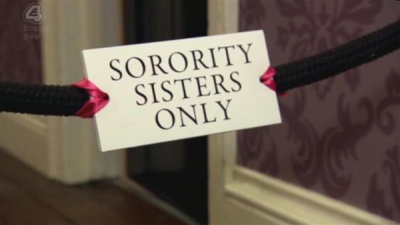Weaver's Week 2011-12-04
Last week | Weaver's Week Index | Next week
Contents |
Sorority Girls
12 Yard for E4, from 8 November
We'd like to give a nice, long, detailed review of Sorority Girls, but we have a problem. This column has one guiding principle: production decisions are always fair game, the comments of public figures are open for critical scrutiny, but we will not adversely judge private contributors. People who score a point a minute on Mastermind have still scored many more than this column ever has. Those who fail on every obstacle of Total Wipeout have still achieved something. The panel on Sorority Girls are doing what they believe to be right.
So, we'll briefly describe the show, and explain our difficulty. What is a sorority? It's a single-sex institution, somewhere between a social club and a mutual aid society, populated by undergraduate university students. Sororities are only open to women, the male equivalent is a fraternity, and both trace lineage back to "dining clubs" such as the Bullingdon.
Each sorority has certain rituals. It has a name in Greek letters, the initials of a key phrase – for this show, the fictional Sigma Gamma was created (probably from the catchphrase Σοροριτι Γιρλσ). There are passwords, secret handshakes, mottos, emblems, and a selection process that seems to be for the entertainment of existing members. This is all entirely alien to the established British culture, and it's no surprise to find that television commentator Harry Hill has delivered a robust critique, along the lines of "What are these people blithering on about?"
It's a made-for-television spectacle, and it's clear that the producers wanted to present the excitement of the selection process, without some of the duller bits, like actually doing university work. They've succeeded, and the whole programme is well-structured. Each episode has a beginning, middle, and end, and all the activities are related to the social selection process.
As much as it sticks in our throat, we can live with the social exclusion – if people wish to judge other people, that is their right. It may not correlate with our values, but we're then judging them judging other people. No, our insurmountable problem comes from the criteria by which people are being judged – on looks, on fashion, on conformity to an alien standard. It is a world where the "standards chair" assumes to herself the right to judge outfits, behaviour, and by extension people, apparently on a whim. Kate Middleton is "appropriate", Lindsay Lohan "inappropriate".
We cannot go into further detail without starting to criticise the participants, both British and visitors. And at this point, we choose to withdraw. Don't criticise the participants. There's already more than enough nastiness and vitriol on the internets.
Nastiness And Vitriol
The Internets, since 1969
Back in the summer, the BBC reported that many contestants on University Challenge had faced a problem after their shows aired. It's not that they were gently mocked by their fellow students for losing (as every side except one will do), but that they were being not-so-gently mocked by people they'd never met.
The internet has brought down the cost and difficulty of talking at people on the telly. Once upon a time, vitriolic critics would have to buy a stamp, an envelope, and fresh supplies of green ink to spill their bile. These days, all they've got to do is find someone's account on popular internet hangouts (SplashFace, The Slap, Friendfeed), and there's an open path into their target's eyeballs.
We saw this report in the summer. We thought that it was desperately sad how Granada felt it necessary to arrange counselling for its contestants, just because some people don't know where to draw the line. And then, after falling headlong into the "Oh dear" trap we usually try to avoid, we filed the thought away for another day.
That other day came in early November, when social commentator and Big Brother refusnik Laurie Penny discussed the harassment she'd received. She was amazed at "just how much time and effort some vicious people are prepared to expend trying to punish and silence a woman who dares to be ambitious, outspoken, or merely present in a public space."
In the aftermath of this piece, there was a short-lived kerfuffle as other social commentators competed to catch up. The Observer made the valid point that this abuse can't be wished away, and that it wasn't invented by the internet. A later piece gave the police's official line: hang up on women who complain about stalking on the internet, because their calls are "inappropriate".
This column doesn't have the answers. We report what we find, and what we've been finding is a whole lot of vitriol flying about the internet. University Challenge seems to be a magnet for this odious behaviour, and we're not entirely sure why. We can hypothesise that it features students, often Oxbridge students, intelligence, upper-class people, well-spoken folk. It's a short step from there to the Bullingdon club, toffs going "rah rah rah" while turning curry houses upside down. We can note that the programme is shown on BBC2, and over three million people watch it each week, and in those three million there will be some who watch it purely to pour vitriol over the contenders.
As regular readers will have noted, we've been taking soundings on one of the microblogging sites this year. We do find people making entertaining remarks, a bon mot worthy of recall a week later. But we find a lot more disparaging comments, coming across as simply destructive criticism. Within thirty seconds of the opening titles, someone asked, "Why does everyone on University Challenge look like a murderer?" The commentator hadn't had chance to do more than glance at the contestants, and already opinions were being leapt to.
The criticism continued unabated. Some reckoned that brains and a sex life were mutually incompatible. "Bet one month's wages every single contestant's a virgin." "Offering evens that none of the contestants has ever touched a girl with their consent." Others judged the contestants by their physical appearance: "All the fabulous uglies." "She is a [chuffing] babe.", or by their style: "What has this [count] got round his neck?" "One team of proper cuboids. One team trying to rebel the look of cuboids but not managing it by a long way." Others managed to combine fashion and anti-student prejudice in one comment "The tax dodging parasites look like they're all from the 1980's."
And so it went on. And on. And on, and on, and on. We gave up after fifteen minutes, we wanted to take the microbloggers and shoot them in front of their families. It seems that anyone who isn't white, working class, straight, and male is ripe for these cheap shots. Anyone who dares to be different is shouted at, simply because they are different. Simply because they threaten the kids in their bedrooms.
This column exists to celebrate the game show in all its forms. We want to cheer along with excellence, we want to sympathise with the player who almost achieves the impossible. Yes, we want to snigger at the team collecting precisely one crystal, but only because their incompetence is truly entertaining.
We don't want to stand idly by while critics take cheap potshots. Our greatest dread is that this sort of idle nastiness will dissuade contestants from applying for game shows. Already, University Challenge suffers from a dearth of women contenders, and the online atmosphere makes it harder to promote balanced sides.
We admire and respect Laurie Penny for speaking up, and for not hanging up her pen when things got tough. We admire and respect all the competitors who put themselves on television for the entertainment of strangers. This column hopes that, by our own example, we encourage sensible and respectful debate of game shows as television art.
University Challenge
Second round, match 6: UCL v Warwick
Warwick won the very first episode of the series, back on 4 July, defeating Edinburgh by 95 points. UCL overcame York by 80 points on 5 September.
Warwick get the first starter, UCL the first bonuses of the night. Pete Postelthwaite gets remembered in one of the early starters, showing this show was recorded this year. Bits of the ear are absolutely no use to Warwick, but UCL get the visual round on Mr. Pulitzer and winners of his eponymous prizes. During this round, Carol Ann Duffy is accidentally killed off, which rather rules out her chances of appearing on the Christmas celebrity series, and brings up a tennis score: 40-30.
The lead is being swapped between the sides, mostly because neither is getting many right. Shall we have an audition for the host of Countdown? Thumper will ask the teams to give words formed from the letters in the words "Das Kapital", such as (er) Calais. As someone close to the actual new host would say:
We wonder, if the editor took all the internet domain wordplay questions asked in the last few years, and bunged them into one show, would it be full? We've reached the audio round, and it's Themes From Science-Fiction Shows Aired On Obscure Satellite Channels, after which UCL leads by 90-85. It would be level, but Warwick didn't know the theme to Blake's 7. Which channel shows Blake's 7 anyway? There are some more dropped starters, then Warwick make a rare achievement. Well, three bonuses on the subject of "rare" to bring the sides level.
UCL take the lead again, and go on with various naval firsts. The second visual round has arrived, it's seascapes, including Hokusai's famous "Wave", and that well-known painter Caravaggio. It's better than a pass. UCL has extended their lead to 145-110. Warwick strike back with questions on Queen Victoria's prime ministers, cutting the gap to 20 points with six minutes to play. Vowels in US states allow UCL to take more points, and they get more on space satellites and the River Nile. More importantly, it runs down the clock – 55 ahead with four minutes to go.
And another correct answer for UCL, allowing them to – possibly – wrap up the game. Ruins don't quite fall for them, but Warwick needs to run the board from here on in. They get the age of the Bank of England, but only one bonus on women Nobel laureates. UCL get the next starter and that is going to be Game Over. The gong saves Warwick from a series of questions on two-letter words that are also chemical symbols, with UCL winning 220-150.
Oh, let's do a Random Punter o'the Week. Tom Coley: "Just watched university challenge. Got 3 questions right."
Next week: Merton Oxford v Balliol Oxford
Only Connect
Third Place Play-off: Listeners v Trade Unionists
Now, we have an Interesting Conundrum, because James Hastie of the Trade Unionists is a setter of The Listener crossword, which gives its name to the Listeners.
"Good old Twisted Flax", says the Listeners to begin the quiz. It's music, and it's bad music. Is it wedding anniversaries, they ask. No, it's the performers, whose names end with a music genre – Iggy Pop, Big Country, David Soul. Bonus for the Unionists, and for Victoria who loved those tunes. We have no idea about the Unionists' own question, Titanic and the Eddystone lighthouse. "All invented in Belfast?" No. "White stars" is the guess from the Listeners, based mainly on the Titanic. No, it's that they killed someone responsible for their creation, including the blood transfusion and the bloke who invented the web rotary printing press.
Pictures for the Listeners, with Barack Obama's dog and a jellyfish and Cristiano Ronaldo. Portugal? Yep, the mutt is a Portugese Water Dog. That's a hard-earned, deceptive, single point. What look like moves in ju-jitsu for the Unionists: Bird's path, Straw road, Silver river, Road to Santiago. They could ask for a hundred clues and have no idea. "I'm not claiming to be on top of this question". Try alternative names for the Milky Way, which would lead to Santiago de Compostela, and a saint's tomb.
Just the one, not a Hecatomb, or an Argus, or even Ten duotrigintillion. Numbers that George Osborne is familiar with. It's actually 100 – a hecatomb is the slaughter of a hundred cattle, and a duotrigintillion has 99 zeroes. The Listeners have one point. Unionists have foodstuffs – melons and coffee and beef. But these aren't any old foodstuffs, they're the most expensive foodstuffs of their type. It's a football score: 2-2.
To the sequences, with Wellington and Melbourne and Salisbury, so the next is Buenos Aires. No. Palmeston. No. Prime ministers at the time of a monarch's accession is the link, Asquith the next. Wick o'Twisted Flax o'Doom has the pictures: a footballer, a hand touching some writing on a screen, and a pause button. The footballer was Peter Crouch, and the last is Engage, stages in a rugby scrum. Two points to the Unionists, five to Mark Labbett of the Rugby Boys.
Shu and Geb and Osiris for the Listeners, who complete the family tree with Horus, because each is the son of the previous. Two points. Doubles, Minor, Triples for the Unionists, who wonder if something will ring their bell. It's methods of ringing bells from 5 bells upwards, and eight is a Major. Wrong reason, right answer, two points.
Back to the Listeners, who have a Sphere, a Spheroid, but – gaah! – they're going down the wrong path. Ellipsoid and Quartic, because the former is a special case of the latter. The I in Sphinx, the O in Borscht, the A in Schmaltz. They're going for the E in Strengths. It's increasingly long words with just a single vowel. Two well-earned points gives them an 8-4 lead.
Grid 133 on the Only Connect website for the Unionists. Some rugby grounds, some dockyards, and a huge amount of what appears to be random jabbing. They're not going for their usual trick of identifying one link and keeping it in reserve, because they don't know the answers. Except they do: literary trilogies, rugby stadia, and breeds of terrier. Ten points!
The Listeners have grid 134, which quite clearly contains some Nordic exports, the Finnish finished furniture you finish yourself. Types of can can come out, then the furniture made from Norwegian wood. Or "Tillgängliga IKEA produkter", as it's captioned on screen. Which leaves Roman goddesses, and famous ornithologists, including William Oddie (Goodie) and James Bond (had a literary character named after him). Ten points!
As you were on the scores, Unionists lead by 18-14. Roads in the USA goes to the Listeners 2-1, and Words With Five Identical Vowels is a 2-2 draw. Movie SPOILERS! is a 1-1 draw. Oh. Which brings up the final result: Trade Unionists finish third, winning the match 22-19.
Next match: The Grand Final
Mastermind
Heat 4
Christmas schedules are in: there's a University Challenge: The Alumni series, another chance to see the UC/OC challenge match, Strictly Come Dancing gets on Christmas night, and the annual Celebrity Mastermind series begins on Holiday Tuesday. Or, if you're being picky, on 11 November.
Susan Holmes kicks proceedings off tonight, taking the Richard Hannay novels of John Buchan (published 1915-36). These five books trace the character through a world of espionage, service in the Great War, and a restless retirement. By far the best-known of these works is the first, "The Thirty-Nine Steps". Clear and precise answers lead the contender to 14 (1).
Peter Royle brings a fuzzy cardigan to the chair, where he'll face questions on The Peak District. A large natural upland area in Derbyshire, the Peak District is named for its types of rock – "White peak", a form of limestone; and "Dark peak", a variety of sandstone. Forests have been cleared by human action, resulting in moorland, and an area rich in unusual varieties of animal and plant life. Another strong round concludes on 14 (2).
Paul Smith has come to the chair in a very natty outfit – black shirt and white waistcoat, all in silk. He's taking Aircraft of World War II. It's a round on planes used in the 1939-45 conflict, such as the Mosquito, Meteor, Spitfire, and Gladiator. Ready! This contender certainly is, ending on 13 (0).
A high standard already this week, and Steve Watson aims to continue it with American number one hit singles, 1955-1994. A list of almost 1000 records, from "Mr Sandman" to "Here comes the Hotstepper", via The Beatles, Elvis Presley, Stevie Wonder, the Supremes, Michael Jackson, and Sir Mix-a-Lot. They let the Bay City Rollers in over there? Goodness. It's straight in at number one, 17 (0).
Paul Smith needs five to take the lead, and a roulette wheel, the Quakers, and William Hague help him to do just that. Then things start to fall apart a little – the contender zigs with "Christchurch" when he should have zagged with "Auckland". But, in a two-and-a-half minute round, there's time to regroup and pick up speed again, concluding with 28 (3).
Fourteen is the somewhat more extensive target for Susan Holmes to move on top. She suggests that a particular US president is Mr. Reagan, not Mr. Obama; but this is one of few errors. Indeed, she is able to decode a question about a food's name, thought got the point, not knowledge. It's not a leading round, finishing on 25 (2). That is a spectacular achievement on its own merits.
In the days of Fifteen-to-One, William G. Stewart would often throw in the question, "Who's the current home secretary?" Peter Royle is asked to remember the one between 2007-9, someone who isn't a household name in her own household. He does remember the modern name of "Byetown" in Canada, but is then asked another stumper: who did Michael Gorbachev succeed as Russian leader? Not even a household name in his own dacha! 25 (5).
Twelve for Steve Watson to win, and he kicks off with tapas and "Peter and the Wolf". Legs akimbo? Wasn't that one of the dance troupes on Top of the Pops? After a shaky middle bit, the round picks up some speed towards the end, even though he doesn't remember the career of Edwina Currie. Four passes so far, but – yes, he gets the final question to take the victory. 29 (4) – had he not recalled that Florence Nightingale was inducted to the Order of Merit, he'd be relying on the repechage board.
This Week And Next
From the land of Sigma Gamma, we hear that there's going to be a general election next year. Some of the potential candidates will take part in a debate on 27 December. Two days after Christmas! That's pantomime season, not serious political discussion season! Anyway, this ding-dong will be moderated by Donald Trump, the original host of The Apprentice. Come 2015, are we going to get the Potential Prime Ministerial debates helmsed by the likes of Knitted Character?
In the ratings to 20 November, Britain has a new number one game show! Well done to Strictly Come Dancing, which attracted 12.25m people to the performance, that's ahead of the 11.25m who saw The X Factor's results. I'm a Celebrity peaked on Monday, with 9.7m seeing day two of the contest. The Cube and The Chase both had 4.05m tuned in. Masterchef The Professionals brought 3.25m to BBC2, with University Challenge on 3m. Come Dine with Me was Channel 4's top game show, 2.25m there.
No Celebrity Juice, so a clear run for The X Factor HD (1.295m) to take the top spot. It was ahead of Sunday's I'm a Celeb HD (1.13m), Tuesday's I'm a Celeb Now on ITV2 (1.08m), A League of Their Own (825,000), Come Dine on More4 (795,000), Only Connect (790,000), and Xtra Factor (785,000). Victoria Coren: now officially more popular than Olly Murs. Elsewhere, Junior Bake Off finished with 385,000, Ben 10 Ultimate Challenge got 100,000, and Fferm Ffactor a ffantastic 75,000 for S4C.
Coming up, a new development in the Preposition tombola, with Come Date with Me (C4, 5pm weekdays) joining Come Dine with Me. A new series of The Million Pound Drop Live (C4, 10pm weekdays), and a terrestrial outing for Alesha's Street Dance Stars (BBC1, 4pm weekdays). Strictly next Saturday runs 6.30 to 8.15, The X Factor Final Part 1 runs 8 to 10.
To have Weaver's Week emailed to you on publication day, receive our exclusive TV roundup of the game shows in the week ahead, and chat to other ukgameshows.com readers, sign up to our Yahoo! Group.


